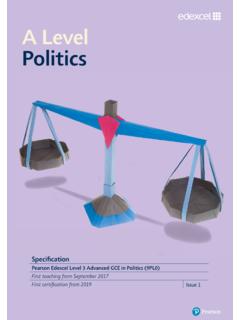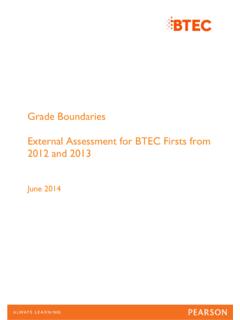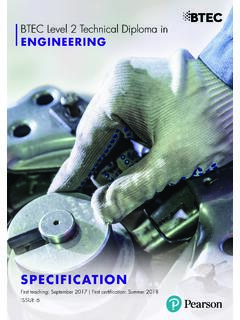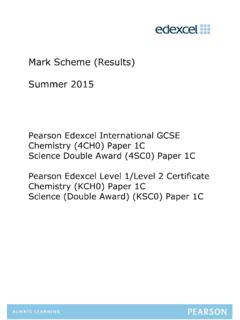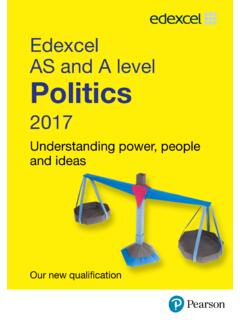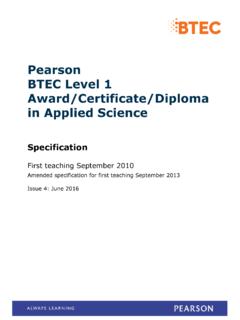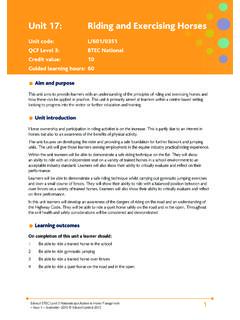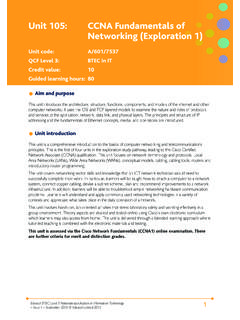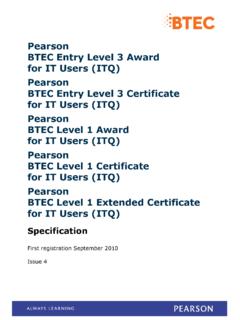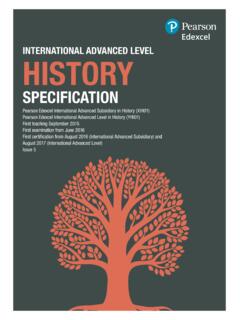Transcription of GCSE (9-1) History - Pearson qualifications
1 SpecificationPearson Edexcel Level 1/Level 2 GCSE (9 - 1) in History (1HI0)First teaching from September 2016 First certification from 2018 Issue 3 GCSE (9-1) History Summary of Pearson Edexcel Level 1/2 GCSE in History specification Issue 3 changes Summary of changes made between previous issue and this current issue Page numbers Addition of a new Paper 1 option 13. This is available for first teaching in September 2021, with first assessment in summer 2022. 4, 17 -19, 62 , 66 Minor updates to taught content in various topics to clarify expectations. Details of these can be found on the GCSE History subject pages. These take effect for assessment in summer 2022. various If you need further information on these changes or what they mean, contact us via our website at: Contents 1 Introduction 2 Why choose Edexcel GCSE History ? 2 Supporting you in planning and implementing this qualification 3 Qualification at a glance 4 2 Subject content 6 Paper 1: Thematic study and historic environment 7 Paper 2: Period study and British depth study 21 Paper 3: Modern depth study 41 3 Assessment information 50 4 Administration and general information 54 Entries 54 Access arrangements, reasonable adjustments, special consideration and malpractice 54 Student recruitment and progression 56 Appendix 1: Codes 61 Appendix 2: Creating a broad and coherent course of study 64 Appendix 3: Interpreting topic content 67 Appendix 4: The context for the development of this qualification 68 Appendix 5.
2 Transferable skills 70 Pearson Edexcel Level 1/Level 2 GCSE (9-1) in History Specification Issue 3 March 20 21 Pearson Education Limited 20 21 2 1 Introduction Why choose Edexc el GCSE History ? We ve listened to feedback from all parts of the History subject community, including a large number of teachers. We ve used this opportunity of curriculum change to redesign a qualification that will engage students with a broad and diver se study of the History of Britain and the wider world and give them skills that will support progression to further study of History and a wide range of other subjects. A unified approach we re offering a single GCSE History specification that gives yo u the freedom to select from the most popular topics in current Modern World and Schools History Project specifications, as well as a number of exciting new topics, including some that are brand new to GCSE.
3 Clear and coherent structure our qualification has a straightforward structure with four elements, assessed through three externally examined papers. There are no prohibited combinations, giving you flexibility to design a coherent course that is appropriate for your students. Historic environment sites nested within thematic studies we have chosen a specific site linked to each of our well-established British thematic studies that will be engaging for students to study. Period studies that provide an unfolding narrative all of the topics we have selected tell a story about a period that shaped the world we live in today. We ve retained two popular topics from current specifications (the Cold War and American West) as well as introducing several new, engaging period studies. Modern non-British depth studies all of our non-British depth studies are from the modern era, allowing the popular topics of Germany, Russia and the USA to be retained, while also including a new China topic.
4 There is a focus on interpretations of History in these depth studies. Medieval and early modern British depth studies to meet the criteria requirement for depth studies to come from two eras, all our British depth studies are pre-modern, with two medieval and two early modern topics to choose from. Clear and straightforward question papers we have focused on ensuring that our question papers are clear and accessible for students and that mark schemes are straightforward in making the requirements clear. Builds on Key Stage 3 we have designed the GCSE to extend students knowledge by studying new areas of content and by revisiting and deepening their knowledge of content studied previously. Supports progression to A Level we planned our GCSE and A Level specifications together. This ensures sensible progression of content from GCSE to A Level and similar approaches to assessment, so that students will have a coherent and diverse experience of History if they take both an Edexcel GCSE and A Level in History .
5 Pearson Edexcel Level 1/Level 2 GCSE (9-1) in History Specification Issue 3 March 20 21 Pearson Education Limited 20 21 3 Supporting you in planning and implementing this qualification Planning Our Getting Started guide give s you an overview of the GCSE History qualification to help you to get to grips with the changes to content and assessment and to help you understand what these changes mean for you and your students. We will give you an editable course planner and topic-specific schemes of work that you can adapt to suit your department. Our mapping documents highlight key differences between the new and 2013 qualifications . Teaching and learning There will be lots of free teaching and learning support to help you deliver the new qualification, including: topic booklets, with background information about the topic, resource lists and timelines guidance on teaching approaches to the thematic study and historic environment guidance on teaching source and interpretations skills.
6 Preparing for exams We will also provide a range of resources to help you prepare your students for the assessments, including: specimen papers to support formative assessments and mock exams levelled exemplars of student work with examiner commentaries. ResultsPlus ResutsPlus provides the most detailed analysis available of your students exam performance. It can help you identify the topics and skills where further learning would benefit your students. Get help and support Our subject advisor service and online community will ensure you receive help and guidance from us and that you can share ideas and information with other teachers. You can sign up to receive e-newsletters to keep up to date with qualification updates and product and service news. Learn more at Pearson Edexcel Level 1/Level 2 GCSE (9-1) in History Specification Issue 3 March 20 21 Pearson Education Limited 20 21 4 Qualification at a glance Content and assessment overview The Pearson Edexcel Level 1/Level 2 GCSE (9 1) in History consists of three externally examined papers.
7 The total qualification mark is 168, of which 8 marks are for spelling, punctuation, grammar and use of specialist terminology (SPaG). Students must complete all assessment in May/June in any single year. The numbering used in the content options relates directly to entry codes and codes used on the examination papers. For more information on these, please see Appendix 1: Codes. Paper 1: Thematic study and historic environment (Paper codes: 1HI0/10 13) Written examination: 1 hour and 15 minutes 30%* of the qualification 52 marks (16 for the historic environment, 36 for the thematic study) Content overview Students take one of the following options: 10: Crime and punishment in Britain, c1000 present and Whitechapel, c1870 c1900: crime, policing and the inner city. 11: Medicine in Britain, c1250 present and The British sector of the Western Front, 1914 18: injuries, treatment and the trenches.
8 12: Warfare and British society, c1250 present and London and the Second World War, 1939 45. 13: Migrants in Britain, c800 present and Notting Hill, c1948 c1970. Assessment overview Section A: historic environment Students answer a question that assesses knowledge plus a two-part question based on two provided sources. Section B: thematic study Students answer three questions that assess their knowledge and understanding. The first two questions are compulsory. For the third question, students answer one from a choice of two. *This weighting relates to assessed content, before including marks for SPaG. Pearson Edexcel Level 1/Level 2 GCSE (9-1) in History Specification Issue 3 March 20 21 Pearson Education Limited 20 21 5 Paper 2: Period study and British depth study (Paper codes: 1HI0/2A 2W) Written examination: 1 hour and 45 minutes 40%* of the qualification 64 marks (32 for the period study and 32 for the British depth study) Content overview Students take one of the following British depth study options: B1: Anglo-Saxon and norman England, c1060 88 B2: The reigns of King Richard I and King John, 1189 1216 B3: Henry VIII and his ministers, 1509 40 B4: Early Elizabethan England, 1558 88.
9 Students also take one of the following period study op tions: P1: Spain and the New World , c1490 c1555 P2: British America, 1713 83: empire and revolution P3: The American West, c1835 c1895 P4: Superpower relations and the Cold War, 1941 91 P5: Conflict in the Middle East, 1945 95. Assessment overview Booklet P Period study Students answer three questions that assess their knowledge and understanding. The first two questions are compulsory. For the third question, students select two out of three parts. Booklet B British depth study Students answer a single three-part question that assesses their knowledge and understanding. The first two parts are compulsory. For the third part, students select one from a choice of two. Paper 3: Modern depth study (P aper codes: 1HI0/30 33) Written examination: 1 hour and 20 minutes 30%* of the qualification 52 marks Content overview Students take one of the following modern depth studies: 30: Russia and the Soviet Union, 1917 41 31: Weimar and Nazi Germany, 1918 39 32: Mao s China, 1945 76 33: The USA, 1954 75: conflict at home and abroad.
10 Assessment overview Section A Students answer a question based on a provided source and a question that assesses their knowledge and understanding. Section B Students answer a single four-part question, based on two provided sourc es and two provided interpretations. *This weighting relates to assessed content, before including marks for SPaG. Pearson Edexcel Level 1/Level 2 GCSE (9-1) in History Specification Issue 3 March 20 21 Pearson Education Limited 20 21 6 2 Subject content Qualification aims and objectives The aims and objectives of this qua lification are to enable students to: develop and extend their knowledge and understanding of specified key events, periods and societies in local, British, and wider world History ; and of the wide diversity of human experience engage in historical enquiry to develop as independent learners and as critical and reflective thinkers develop the ability to ask relevant questions about the past, to investigate issues critically and to make valid historical claims by using a range of sources in their historical context develop an awareness of why people, events and developments have been accorded historical significance and how and why different interpretations have been constructed about them organise and communicate their historical knowledge and understanding in different ways and reach substantiated conclusions.
